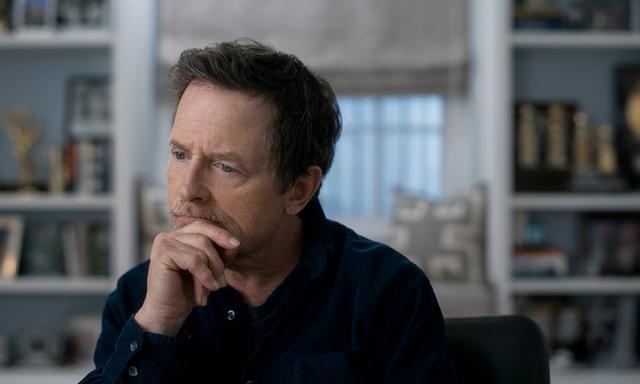Told using archive footage, clips from his movies ranging from 'Doc Hollywood' to 'Back To The Future', on-set footage from 'Family Ties' and 'Spin City', and beyond, 'Still: A Michael J. Fox Movie' reveals the life and lessons learned of the actor...
One of the first scenes in 'Still' finds Michael J. Fox walking along a sidewalk with his physiotherapist trying to negotiate his walking with him as he's going along. The effects of Parkinson's Disease are unavoidable. A woman, dressed in scrubs, walks by him and offers him light encouragement. Fox turns to acknowledge her and stumbles to the ground and loses his shoe. When he's helped up, he chuckles lightly. "You knocked me off my feet," he charms. You couldn't write an interaction like that, it only comes when you can think fast, talk fast, and have an ever-flowing supply of charisma.
How 'Still' approaches Michael J. Fox is not one of an icy examination or a cosied-up insider lobbing softball questions at him. It's almost closer to a confession. Fox is brutally honest with himself and with us, the audience. The camera is right up on him at every point, and he speaks right through the lens. He's got a black eye at one point, which he explains with almost alarming candour. He fell, he hit his face on the side of a chair. It happens. 'Still' isn't entirely about his Parkinson's, so much as it's about what it gave him. Through skilful reenactments, we see him darting between the sets of 'Family Ties', 'Teen Wolf', and the first 'Back To The Future' while he gets maybe two or three hours of sleep a night. He does this for three months, and then he's the Boy Prince of Hollywood - on the cover of every magazine, on every talk show, on all the red carpets.
The documentary doesn't shy away from how much of an ass Fox was at this point. Indeed, Fox is again frighteningly honest about it. He slept around, he partied on Sunset Strip with other '80s luminaries like Rob Lowe and Tom Cruise, he bought sports cars and a house with a pool, but by the time he's in his mid-twenties, he meets his wife and it all changes because she's able to give him the one thing his life hasn't had to this point - the ability to see past his own bullshit. It's not long after this, in fact, that he's diagnosed with Parkinson's and things take a turn. His drinking becomes even more pointed, because now, as he unflinchingly admits, he was drinking to disassociate. Before, he acted to get out of his own mind and be someone else, but now he's drinking to leave behind his reality.
Guggenheim's direction and Michael Harte's editing are able to graft together both Fox's candid interviews with the wealth of footage about him to bring the whole thing to life. Indeed, Fox talks about how he tried to hide his diagnosis on the set of 'Spin City' by constantly moving around the set and playing with props or items on his desk to hide the shaking, followed by clips and scenes pointing this all out. Later, when it cuts to him in his present day, we see him going through physiotherapy, making wise-ass jokes with his doctor, and cracking up with laughter with his kids and his wife. It may be using conventional documentary language, but it's still got an impact.
In the end, 'Still' is not about an actor brought low by a medical condition, or a redemption story, or even his resilience in the face of it all. 'Still' goes much deeper than that, and talks about how a person can spend their lives trying to run away from themselves. In Fox's case, he spent years and years running, but when he was made to look at both his diagnosis and himself, it nearly ended him but gave him the chance to stop and look, and eventually accept himself. That this is all captured in a documentary is something truly unique and wonderful.





















































































